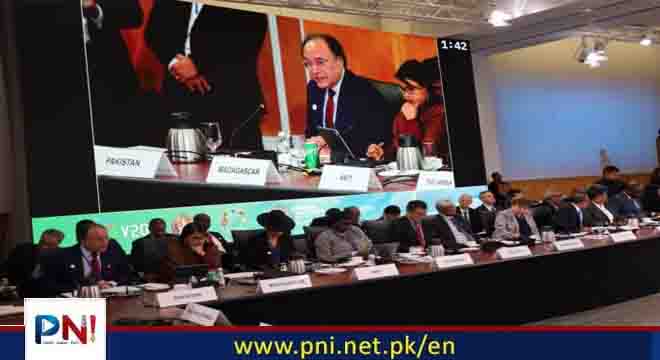ISLAMABAD, Oct 23 :Federal Minister for Finance and Revenue, Senator Muhammad Aurangzeb, said in Washington that Pakistan is in the process of developing its Climate Prosperity Plan and urged Multilateral Development Banks (MDBs) to expand grant opportunities and concessional financing windows.
The minister was participating in the Vulnerable Twenty Group (V20) Ministerial Dialogue on the theme “Realizing Climate Prosperity through Financial Reform, Debt Solutions, and Affordable Capital.
The minister emphasized the need to reform global finance to “make debt work for the climate,” according to press release issued by finance ministry here Wednesday.
He also endorsed the official recognition of the V20 by the International Monetary Fund (IMF) as an official intergovernmental group.
Aurangzeb is leading the Pakistan delegation to the Annual Meetings WB and IMF, being held in Washington DC from 21-26 October 2024. Other delegates include Finance Secretary, Imdad Ullah Bosal; Secretary Economic Affairs, Dr. Kazim Niaz and Governor, State Bank of Pakistan, Jameel Ahmad.
Meanwhile, the minister on the sidelines of annual meetings, met with a delegation from CitiBank led by Jay Collins, Vice Chair of Public Sector.
During the meeting, the Finance Minister briefed the delegation on Pakistan’s economic stabilization and the ongoing reforms in the areas of taxation, energy, SOEs, pensions, and government rightsizing.
He also outlined the long-term “Road-to-Market” strategy, stating that tapping into international capital markets would be on the government’s agenda in due course.
The minister also attended the G-24 Ministers and Governors Meeting and urged all development partners to work closely together to resolve the pressing issues of climate change, population growth and child stunting faced by developing countries especially Pakistan.
In his statement on becoming the Second Vice Chair of G-24 Bureau during the fiscal year 2024-25, Finance Minister emphasized the need to address issues including high debt burdens on developing countries, need for climate action and greater representation of developing countries in the Bretton Woods institutions.
Aurangzeb also had meeting with Makhtar Diop, Managing Director International Finance Corporation (IFC).
Issues relating to expedited evaluation of bids for Islamabad airport, Diversified Payment Rights (DPR), raising local currency through offshore bond issuance, privatization of DISCOs and HBFC came under discussion.
He thanked IFC for its advisory and financial support to Pakistan and requested the Managing Director to deploy innovative financing models and support private investments in agribusiness, healthcare, water, transportation and digital infrastructure in Pakistan.
He outlined the government priorities of modernizing electricity transmission and distribution networks, which could benefit from enhanced IFC support and technical assistance.
He also appreciated IFC’s continued assistance to Pakistan, including in PIA’s privatization which the government expected to finalize by the end of the year. He extended the invitation to Diop to visit Pakistan.
Aurangzeb also met with his Saudi counterpart, Mohammed Aljadaan and the two ministers resolved to further deepen mutually beneficial economic ties, enhance bilateral trade, and facilitate investments in key sectors. The Saudi Minister shared his experience of reforms in the energy sector. Both sides agreed to advance cooperation in areas of mutual interest.
Finance Minister had a fireside chat with Director Middle East and Central Asia Department (MCD), IMF, Jihad Azour in the forum “Governor Talks- Pakistan From Stabilization to Sustainable Growth via Structural Reforms.”
He highlighted policy actions taken by the government to regain economic stability, increase tax revenues, make taxation in Pakistan fairer and more efficient and tackle deep-seated-structural distortions to move the country from stabilization to growth.
Likewise, Finance Minister held a meeting with Türkiye’s Treasury and Finance Minister, Mehmet Simsek and stated that there existed great potential to enhance the current volume of bilateral trade.
Finance Minister said that Pakistan could learn from Türkiye’s experience of power sector reforms and invited Turkish firms to enter into mutually beneficial joint ventures with Pakistani counterparts.
Finance Minister met with Brent Neiman, Assistant Secretary for International Finance of the US Treasury Department in Washington DC and briefed him about measures to broaden the tax base, align provincial AIT regimes with federal personal/ corporate income tax rates, rationalize subsidies, reform the energy sector, overhaul SOEs and build climate resilience through the effective implementation of the C-PIMA Action Plan and enhanced climate adaptation investments.
He also thanked US for its support to Pakistan in securing the IMF’s Extended Fund Facility (EFF).
Neiman appreciated the government’s commitment to wide-ranging structural reforms resulting in reduction of fiscal and current account deficits and reduced inflation. The two sides discussed ways to strengthen cooperation between the financial sectors of Pakistan and the United States.
In addition, Aurangzeb interacted with the World Bank-IMF Staff Association and provided an overview of the continued stabilization measures undertaken by Pakistan, supported by the IMF Extended Fund Facility.
He expressed Pakistan’s resolve to sustain growth by achieving fiscal consolidation, improving the governance and management of SOEs, reducing high energy costs in the power sector, and raising productivity and competitiveness by creating a more favourable business environment for the private sector.
Follow the PNI Facebook page for the latest news and updates.









